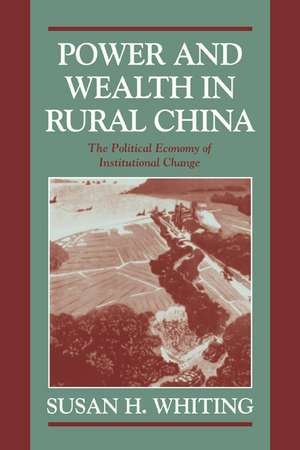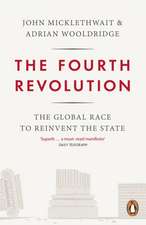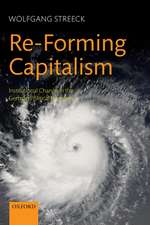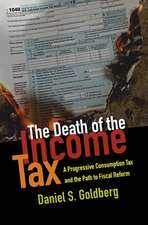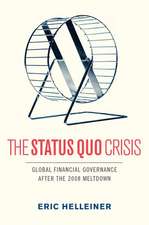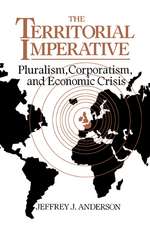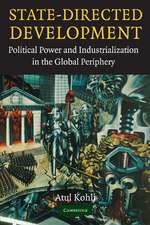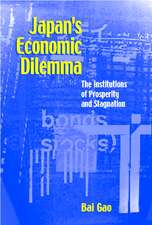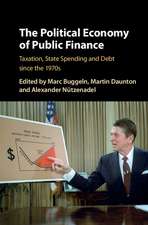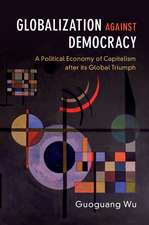Power and Wealth in Rural China: The Political Economy of Institutional Change: Cambridge Modern China Series
Autor Susan H. Whitingen Limba Engleză Paperback – noi 2006
Toate formatele și edițiile
| Toate formatele și edițiile | Preț | Express |
|---|---|---|
| Paperback (1) | 323.05 lei 6-8 săpt. | |
| Cambridge University Press – noi 2006 | 323.05 lei 6-8 săpt. | |
| Hardback (1) | 781.98 lei 6-8 săpt. | |
| Cambridge University Press – 26 noi 2000 | 781.98 lei 6-8 săpt. |
Din seria Cambridge Modern China Series
-
 Preț: 286.89 lei
Preț: 286.89 lei -
 Preț: 281.59 lei
Preț: 281.59 lei -
 Preț: 286.89 lei
Preț: 286.89 lei -
 Preț: 286.69 lei
Preț: 286.69 lei -
 Preț: 280.91 lei
Preț: 280.91 lei -
 Preț: 287.87 lei
Preț: 287.87 lei - 11%
 Preț: 695.59 lei
Preț: 695.59 lei -
 Preț: 288.62 lei
Preț: 288.62 lei -
 Preț: 327.79 lei
Preț: 327.79 lei -
 Preț: 321.14 lei
Preț: 321.14 lei -
 Preț: 338.22 lei
Preț: 338.22 lei -
 Preț: 326.53 lei
Preț: 326.53 lei -
 Preț: 394.29 lei
Preț: 394.29 lei -
 Preț: 361.00 lei
Preț: 361.00 lei -
 Preț: 425.05 lei
Preț: 425.05 lei -
 Preț: 255.85 lei
Preț: 255.85 lei -
 Preț: 252.88 lei
Preț: 252.88 lei -
 Preț: 321.31 lei
Preț: 321.31 lei -
 Preț: 284.98 lei
Preț: 284.98 lei -
 Preț: 331.82 lei
Preț: 331.82 lei -
 Preț: 287.28 lei
Preț: 287.28 lei -
 Preț: 287.87 lei
Preț: 287.87 lei -
 Preț: 356.53 lei
Preț: 356.53 lei -
 Preț: 243.53 lei
Preț: 243.53 lei
Preț: 323.05 lei
Nou
Puncte Express: 485
Preț estimativ în valută:
61.83€ • 66.74$ • 51.84£
61.83€ • 66.74$ • 51.84£
Carte tipărită la comandă
Livrare economică 19 aprilie-03 mai
Preluare comenzi: 021 569.72.76
Specificații
ISBN-13: 9780521028417
ISBN-10: 0521028418
Pagini: 372
Ilustrații: 4 b/w illus. 2 maps
Dimensiuni: 152 x 228 x 23 mm
Greutate: 0.54 kg
Editura: Cambridge University Press
Colecția Cambridge University Press
Seria Cambridge Modern China Series
Locul publicării:New York, United States
ISBN-10: 0521028418
Pagini: 372
Ilustrații: 4 b/w illus. 2 maps
Dimensiuni: 152 x 228 x 23 mm
Greutate: 0.54 kg
Editura: Cambridge University Press
Colecția Cambridge University Press
Seria Cambridge Modern China Series
Locul publicării:New York, United States
Cuprins
List of maps, figures, and tables; Preface; 1. Explaining institutional change; 2. The Maoist legacy in rural industry; 3. Incentive structures and local cadre behavior; 4. Incentives, constraints, and the evolution of property rights; 5. Statis and change in extractive institutions; 6. Credit allocation and collective organizational structures; 7. The political economy of institutional change; Appendix; Bibliography; Index.
Recenzii
'Whiting's is an exciting and well-researched specialist book that contributes valuable insights to the study of the political economy of change in the richest parts of rural China in the 1980s and 1990s, in particular with regard to local governance, rural taxation and rural enterprises.' China Review
'This volume should be part of any research-oriented collection on contemporary China.' Choice
'The book is a major contribution to the political economy literature on China.' Political Studies
'… a rich and detailed institutional analysis …' Democratization
'Power and Wealth in Rural China is a splendid book that will become a benchmark for subsequent studies of institutional change in post-socialist societies. Whiting's contribution will enrich and elevate the standard of contemporary debates on institutional change and market reform. This book exemplifies the best work of a new generation of political economists working on the developing world in an era of globalization.' Kiren Aziz Chaudhry, University of California, Berkeley
'China's rural collective industry has been the true engine of that nation's remarkable economic development in the past two decades. This study clarifies better than any other the institutional context of those township and village industries. Whiting provides a convincing explanation for the entrepreneurial behavior of collective cadres, as well as for the very recent tendencies toward privatization. This is an excellent study of a hugely important subject and is a must-read book for those interested in political economy, rural studies, and development.' Philip Huang, University of California, Los Angeles
'The Chinese economic reform reached a new level of complexity during the 1990s and many questions are now being asked about its nature and prospects. Based on extensive interview and documentary sources, Susan Whiting's new book helps us to answer these questions. Whiting's particular contribution is to focus on local-level systems and to explain persuasively both the direction in which reform is going and the ways in which national and local scenes interact. The overall result is a valuable contribution to the literature.' Christopher Howe, School of Oriental and African Studies, University of London
'Susan Whiting provides a powerful analysis or rural industrialization in Communist China that makes a contribution not only to the field of Chinese politics, but also to general theories of institutional change. Rather than simply argue, as many 'path-dependent' approaches do, that previous patterns of interaction shape future trajectories, Whiting shows how the national political economy may serve to transform the incentives and constraints imposed by local institutions.' Elizabeth J. Perry, Harvard University
'Whiting builds an astonishingly rich and powerful interpretive framework in this study of government and industry in rural East China. Beginning with a solid foundation of personal experience derived from extensive fieldwork, Whiting employs a rigorous comparative research design to analyze the divergent paths of rural industrialization and to explain their political causes and consequences. Her close attention to incentives within the complex Chinese institutional environment pays an unexpected bonanza when she is able to deploy it to explain not just local politics, but interactions between local and central policymakers as well. A work destined to take its place on the short-list of essential works on China in transition.' Barry Naughton, University of California, San Diego
'This volume should be part of any research-oriented collection on contemporary China.' Choice
'The book is a major contribution to the political economy literature on China.' Political Studies
'… a rich and detailed institutional analysis …' Democratization
'Power and Wealth in Rural China is a splendid book that will become a benchmark for subsequent studies of institutional change in post-socialist societies. Whiting's contribution will enrich and elevate the standard of contemporary debates on institutional change and market reform. This book exemplifies the best work of a new generation of political economists working on the developing world in an era of globalization.' Kiren Aziz Chaudhry, University of California, Berkeley
'China's rural collective industry has been the true engine of that nation's remarkable economic development in the past two decades. This study clarifies better than any other the institutional context of those township and village industries. Whiting provides a convincing explanation for the entrepreneurial behavior of collective cadres, as well as for the very recent tendencies toward privatization. This is an excellent study of a hugely important subject and is a must-read book for those interested in political economy, rural studies, and development.' Philip Huang, University of California, Los Angeles
'The Chinese economic reform reached a new level of complexity during the 1990s and many questions are now being asked about its nature and prospects. Based on extensive interview and documentary sources, Susan Whiting's new book helps us to answer these questions. Whiting's particular contribution is to focus on local-level systems and to explain persuasively both the direction in which reform is going and the ways in which national and local scenes interact. The overall result is a valuable contribution to the literature.' Christopher Howe, School of Oriental and African Studies, University of London
'Susan Whiting provides a powerful analysis or rural industrialization in Communist China that makes a contribution not only to the field of Chinese politics, but also to general theories of institutional change. Rather than simply argue, as many 'path-dependent' approaches do, that previous patterns of interaction shape future trajectories, Whiting shows how the national political economy may serve to transform the incentives and constraints imposed by local institutions.' Elizabeth J. Perry, Harvard University
'Whiting builds an astonishingly rich and powerful interpretive framework in this study of government and industry in rural East China. Beginning with a solid foundation of personal experience derived from extensive fieldwork, Whiting employs a rigorous comparative research design to analyze the divergent paths of rural industrialization and to explain their political causes and consequences. Her close attention to incentives within the complex Chinese institutional environment pays an unexpected bonanza when she is able to deploy it to explain not just local politics, but interactions between local and central policymakers as well. A work destined to take its place on the short-list of essential works on China in transition.' Barry Naughton, University of California, San Diego
Descriere
This study focuses on China's rural industries, offering a theoretical framework to explain institutional change.
